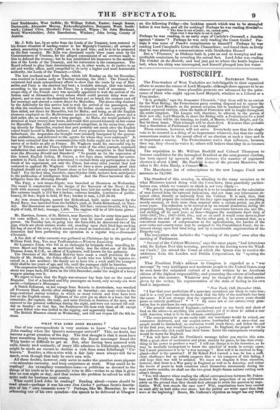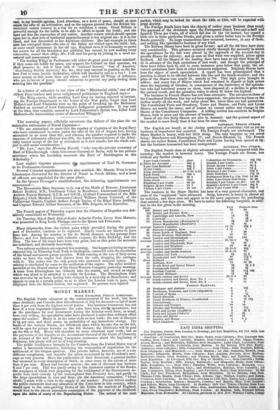That President Polk's address to Congress is regarded as a
" war message" by very intelligent and moderate people in the United States, may be seen from the subjoined extract of a letter written by an American citizen of the highest respectability, and possessing the esteem of influential persons in this country. Whatever may be thought of the direct advice given by the writer, his representation of the state of feeling in his own land is important.
"New York, 14th December 1845. " I fear that your predictions oT a monetary convulsion are likely to come true; and it is a very poor consolation to think that the folly of the multitude has been the cause. Is it not strange that the experience of the last seven years should prove so entirely profitless? * * • By some law of our nature, every gene- ration has to purchase its own experience. " The present situation of England—railroad-mad on one hand, and short of food on the other—is anything but satisfactory; yet if to these bo added a war with America, what is to be the ultimate consequence? "The consequences to us are easily told: our merchants would be ruined, our commerce destroyed, and our seaport-towns bombarded all at once—but our people would be untouched; no starvation would reach them; and before the end of e first year, war would become a pastime. In England, the people old be the sufferers—the rich could bear their losses: hence the.consequences eventually would be worse for England. " You will have read the President's message before you receive this note. With a great show of moderation and pious anxiety for peace, he has done every thing in his power to produce a war ! I will not charge it to his intention, as he may be mentally incompetent to know the mischief of words in certain cases; but I must pronounce it to be a war message'! How will it be received in Eng- gland—that is the question? If Sir Robert Peel wanted a war, he has a suffi- cient challenge; but as nobody suspects him or his compeers of this failing, I
still hope that war will be avoided. We must not disguise it from ourselves, however, that there is a War party in England as well as in America; and unless the lovers of peace in both countries exert themselves strenuously during the next twelve months, we shall see the two great Anglo-Saxon nations cutting each other's throats.
"You will observe when reading the official correspondence between Mr. Paken-
ham and Mr. Calhoun, that the latter declined the proposition of an arbitration solely on the ground that they should first attempt to settle the question by nego- tiation. Well, how stands the case now ? Why, negotiations have been carried on most ably on both sides ever since; but the parties are wider apart than they were at the beginning ! Hence, Mr. Calhoun's objection no longer has any fora;
and, in my humble opinion, Lord Aberdeen, as a lover of peace, should at once renew the offer of an arbitration, and on the express ground that the British Go- vernment cannot consent to a war for so worthless a cause. Great Britain is powerful enough for the battle to be able to afford to speak the truth; and she need not fear the reproaches of any nation. Another reason which should operate n..n her is, that love of territorial aggrandizement is her original sin: it is in her
and has descended to her American children. Her bad example in times past has corrupted them—the sins of the father are visited upon the child: but, as some small atonement in her old age, England owes it to humanity to prove her sorrow for all the bloodshed her ambition has caused, by now mailing every concession, sooner than oblige Mr. Polk and his party by joining in a most un- natural and unnecessary war. " The leading Whigs in Parliament will either do great good or great mischief: if they come out boldly for peace, and support the Cabinet on that question, we shall preserve it; but if they talk of ' national honour,' fear of America,' ' abandoning British interests, &c. &c., they may succeed in goading on Sir Ro- bert Peel to some hostile declaration, which will inevitably end in a war! I am more uneasy on this score than any other; and I think all Whigs of influence, who are in favour of peace, should endeavour to prevent any party-feeling from entering into the question."
In a letter of adhesion to our view of the " Ministerial crisis," one of the oldest Free-traders and most enlightened politicians in England says- " The Whig coterie, while assailing Lord Grey for having objected to intrust- ing the Foreign Department to the leader of the War party, forget that Lord Holland and Lord Clarendon were on the point of breaking up the Melbourne Cabinet on account of Lord Palmerston's belligerent propensities. It was said at the time that vexation, caused by Lord Palmerston s Syrian war, killed Lord Holland—the harmonizing centre of discordant Whiggery."































 Previous page
Previous page